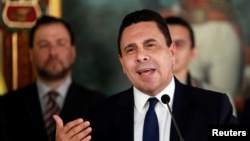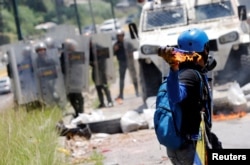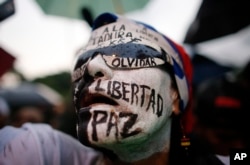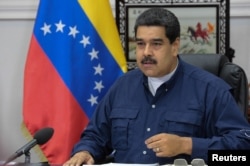Venezuela's foreign minister said Tuesday the country is moving forward with plans to elect members of a constitutional assembly despite threats of new sanctions by the United States, and plans to review its relations with Washington.
"The constitutional assembly is happening," Foreign Minister Samuel Moncada said on state television. He also said Venezuela is "conducting a deep review of relations with the U.S. government because we don't accept humiliation from anyone."
White House officials on Tuesday stressed they are ready to follow through on President Donald Trump's threat to take "strong and swift economic action" if Maduro goes ahead with a vote for the special assembly on July 30.
"The Maduro regime ... cannot be allowed to continue to go down its path toward becoming a full dictatorship," a senior Trump administration official said.
Reuters reported Tuesday the U.S. is preparing sanctions against several senior Venezuelan officials, including the country's defense minister. The U.S. is also considering wider economic steps, the official said, adding: "All options are on the table."
Ban oil imports from Caracas?
It was not clear whether the U.S. administration might act to ban oil imports from Venezuela.
"We absolutely reserve the right to make unilateral decisions at the time and place of our choosing," the official said. "I would not be surprised if we still take further actions before July 30, because we are very troubled and worried about the situation in Venezuela."
The sanctions threat comes after Venezuela's opposition launched what it says is a "final offensive" on Maduro to call for early presidential elections.
In a nonbinding national referendum Sunday organized by opposition groups, more than seven million Venezuelans — nearly one-third of the national electorate — called on Maduro to give up the idea of electing a special assembly to put together a new constitution.
The opposition group also called for a daylong general strike Thursday, hoping to pressure Maduro into calling off plans for a new constitution.
Maduro brushes off opposition
Maduro called the opposition referendum illegal and is continuing to push ahead with plans for a July 30 vote for the special assembly.
Changing the constitution is the only way to pull Venezuela out of its deep economic and social crisis, the president said.
"I'm calling on the opposition to return to peace, to respect the constitution, to sit and talk," he said Sunday. "Let's start a new round of talks, of dialogue for peace."
The opposition says the assembly will be rigged in Maduro's favor. It says rewriting the constitution is nothing but a Maduro ploy to dissolve state institutions and turn Venezuela into a socialist dictatorship, leaving the opposition-led national assembly irrelevant.
Shortages in shops and lack of rights
One voter who rejects the idea of a new constitution told The Associated Press: "There's no medicine, no food, no security. ... No separation of powers, no freedom of expression."
Lower global energy prices and government corruption have destroyed Venezuela's once-thriving economy, which is dependent on oil revenues.
Consumers face severe shortages of basic goods such as gasoline, flour, sugar and cooking oil. Supermarket shelves are bare and many Venezuelans cross into neighboring Brazil and Colombia to buy food.
Daily street protests against the government frequently blow up into violence. Nearly 100 people have been killed over the last three months.
Maduro blames his country's woes on what he calls U.S. imperialism. He warns against intervention by the Organization of American States, saying that would surely bring on civil war.
Kenneth Schwartz contributed to this report.



